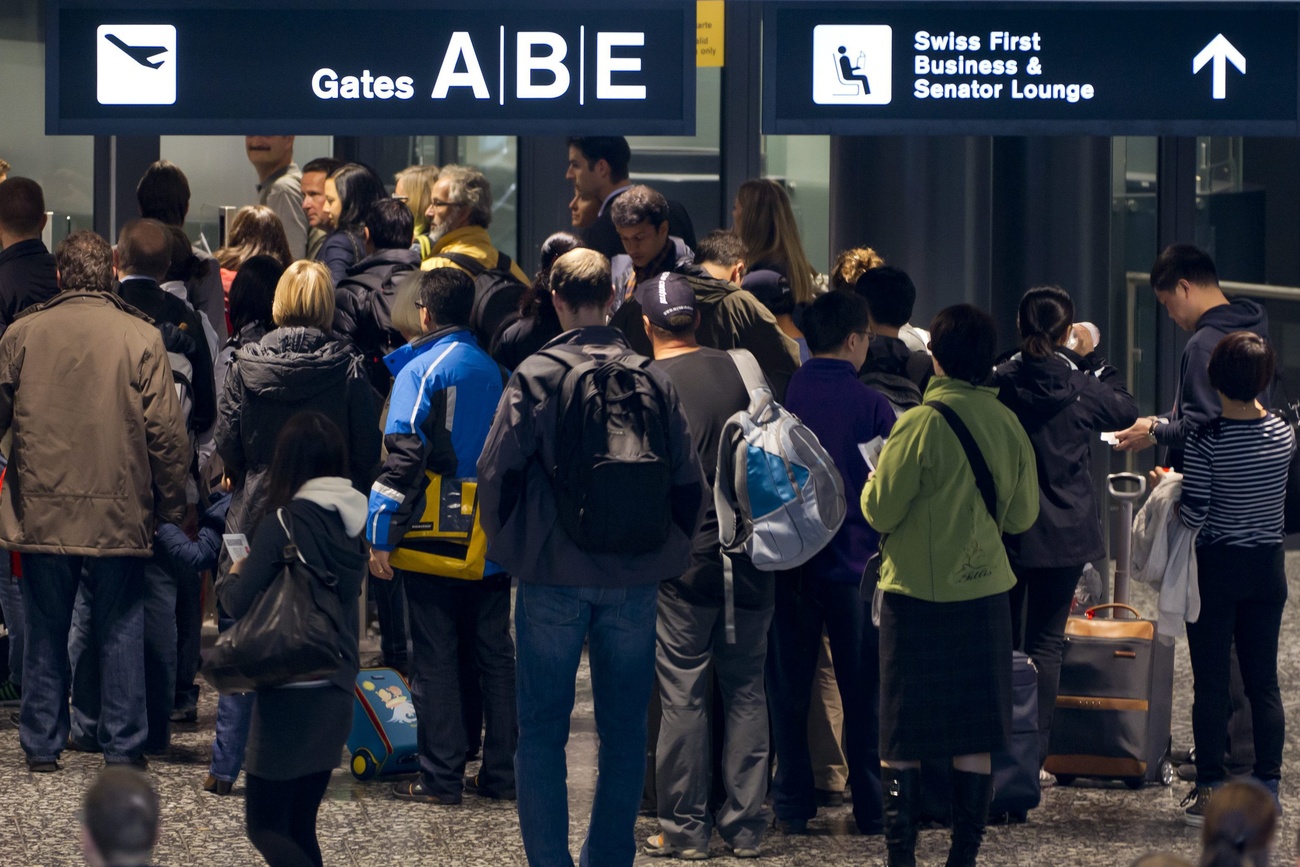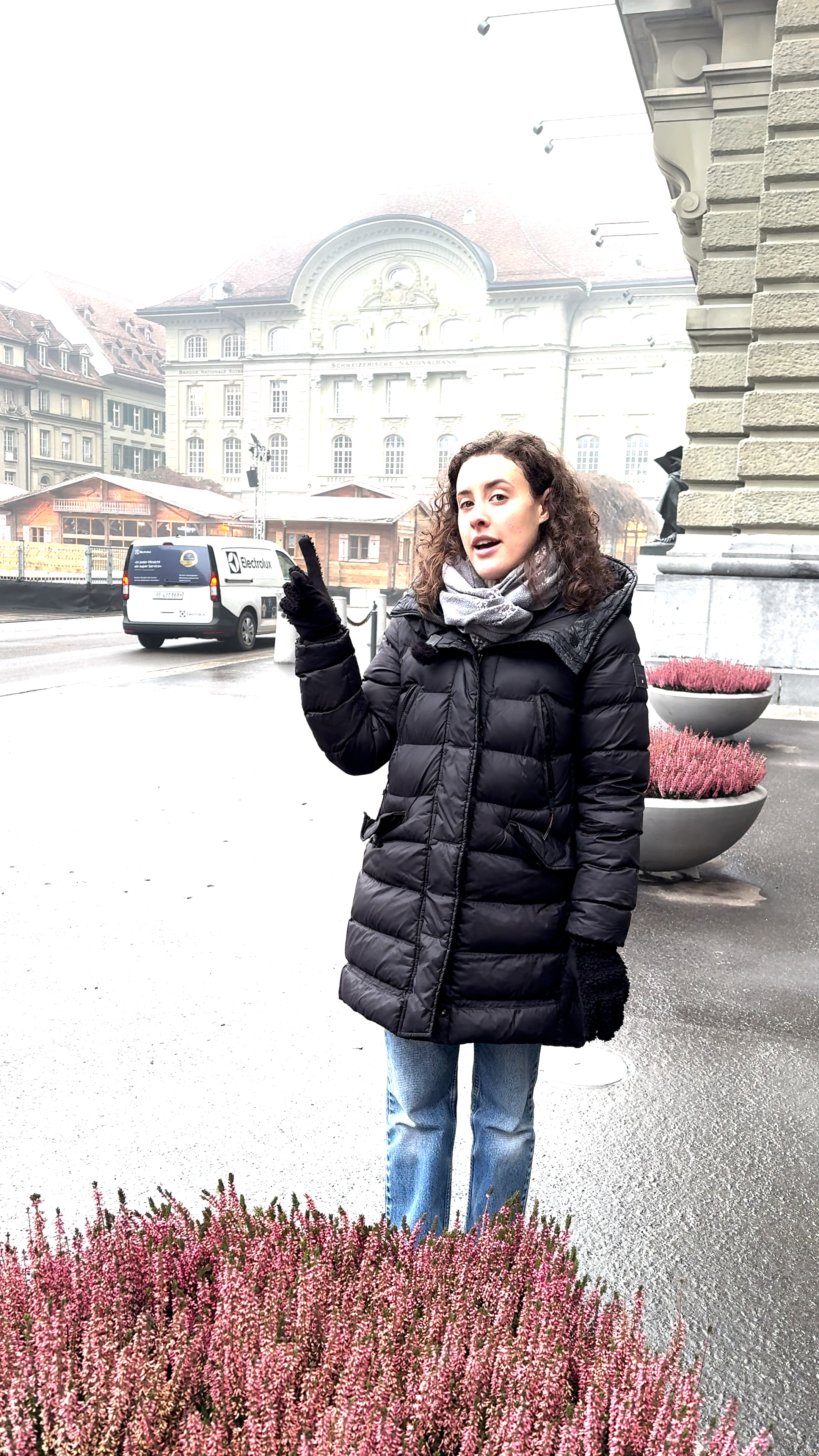
Migrants in Switzerland speak of gratitude, pride – and setbacks

Most immigrants consider quality of life and career opportunities in Switzerland to be excellent. But they also cite integration difficulties and disappointments. Their views reflect the ambivalence and diverse experiences that often mark migratory journeys.
Immigrants make up almost a third of Switzerland’s population. This is one of the highest proportions in the world. In 2024, 190,000 foreigners moved to the Alpine country. But many more (over 95,000) made the journey in the opposite direction.
Most who immigrate to Switzerland don’t settle forever in the country, as the article below explains:

More
In Switzerland, migration isn’t just inbound
What’s the experience of foreigners in Switzerland? How do they view their host country? To find out, Swissinfo launched a call for contributions in April 2025 from people who have immigrated to the country.
To date, we have received over 60 responses. Without claiming they are representative, the respondents’ accounts offer insight into how outsiders see Switzerland’s strengths and weaknesses. They also confirm that migration is rarely a seamless journey.
Read all the comments here:
More
Excellent living environment
The vast majority of migrants are satisfied or very satisfied with their decision to move to Switzerland, according to the Migration-Mobility SurveyExternal link, conducted at regular intervals by the University of Neuchâtel’s NCCR – On the Move migration research centre.
In the sample of answers received by Swissinfo, meanwhile, half of the comments were very positive, the other half more critical. Only a minority were outright negative.
Many contributors, including some of the most critical, agree that Switzerland offers an excellent living environment: efficient public services, as well as security and organisation which are often considered better than in their country of origin.
“I came from Slovenia to work in IT,” wrote Swissinfo reader Sloch. “The process was very smooth, with minimal bureaucracy […] The people are polite, everything is clean, the infrastructure is good, the public services really serve people, and so on.”
“Above all, I love [Switzerland’s] landscapes and the fact that everything works here,” noted Frenchwoman Cocopomme, who has lived here for 35 years. “Most of the time you can trust people, everything is good quality, and I feel safe here.”
With a dynamic job market and high salaries, Switzerland can seem “a country of hope where anything is possible”, as was the case for Pignat.P. Originally from Portugal, she came “unqualified” to Switzerland nearly 11 years ago and is “now qualified in health”. “Switzerland has given me a future,” she says. “Today I have a standard of living that I never imagined in my native country.”
Like others, however, she adds that it has not been an easy journey. Language is one of the main obstacles to entering the job market. In Switzerland, English is rarely enough. You often need to master at least one national language (German, French or Italian).
This partly explains why nationals of neighbouring countries make up the majority of immigrants to Switzerland.
“I am already doing intensive German courses, but progress is taking time,” says Muhammad Ayub Ayubi, who says he left Afghanistan in 2022. Describing himself as a doctor with 18 years’ experience, he says he is “finding it difficult to find a job in [his] field”.
In his view, Switzerland could do a better job of integrating qualified foreign workers. One way of doing this would be to facilitate recognition of international qualifications. Ghanaian- born Amaswiss, who has been living in Switzerland for 25 years, says she has also met the problem of her qualifications not being recognised. “I had to start all over again,” she writes.
In this article from 2021, we looked at restrictions on labour from outside Europe:

More
Pandemic reveals Switzerland’s weak spot in securing foreign talent
Scant support for families
Two contributors are also highly critical of what they say are weaknesses in Switzerland’s family policy. They criticise the system for making it difficult to reconcile work and family life, and for penalising women in particular.
“The system doesn’t support working parents, especially mothers, who are expected to work 100% and manage everything else at the same time,” says PineTree, 37, from Lithuania. This mother of a young child adds that “it’s very difficult to work full-time when you don’t have family around you”. She says this summer she plans to leave Switzerland, where she has lived since 2017.
Diana N made a similar comment. “Many women with children (foreigners, at least) would like to work AND be mothers […] but unfortunately it’s very difficult to do so in Switzerland unless you’re very rich and can hire a full-time nanny or pay for a crèche,” she says. “Switzerland should make crèches available, and stop making women feel guilty for putting their children in them.”
“Society tends to consider that women’s primary role is being mothers, and that their salary is a secondary wage,” says the sociologist Jean-Marie Le Goff in this article on the unequal division of tasks in Switzerland:

More
Mum in the kitchen, dad in the shed: why roles are slow to change in Switzerland
Integration, a long and complex process
Experiences of integration are generally very mixed. One of the most frequently cited downsides of living in Switzerland is the the difficulty of establishing social relations.
Some contributors admit they were unable to feel at home and accepted. This is the case of Paul S, originally from the UK. One of the main reasons he and his wife don’t plan to settle permanently is that they find it “difficult to be part of the community”.
Canadian Rss1 says he discovered Switzerland in 1971, when he was a diplomat. He was “initially fascinated by the country”, before seeing his “hopes dashed”. “After 50 years of trying to understand the Swiss, I have come to the conclusion that the country has magnificent landscapes but […] its culture does not bend to the rest of the world.”
Several contributors also say they have experienced racism. One example is Eric Thee Great, who describes himself as “a black man from the United States”. He condemns the “passive-aggressive racism and ostracism” that he faces, as well as a failure to include people of colour in certain professions like the civil service.
Dave 456’s message suggests he attributes the professional rejections he has received to his name and skin colour. “If you are white, Christian, have a similar culture and come from Germany or France, it will be easier for you to find a job in Switzerland,” he writes. “If you have a non-European-sounding name, if you are darker-skinned, […] it will be very difficult for you.” But he says he is nevertheless happy to be in Switzerland.
Proud of becoming Swiss
Several respondents who consider themselves well integrated highlight their efforts to embrace Swiss culture and values. Sloch from Slovenia, for example, writes: “I’m bilingual in German, and I think that plays a big part in integration […]. But I also adapt to local customs. As a foreigner, you should know you are a guest and respect your host.”
João Zuzarte de S. Graça from Portugal, who has lived in Switzerland for over 40 years, says: “It’s not easy, because Switzerland has its own culture, which is unique in the world and can sometimes be a bit rigid. But only those who can’t or don’t want to understand Swiss society don’t fit in.”
“As an immigrant who wants to integrate, you will always be alone, in other words you will always be the immigrant in a group of Swiss,” agrees Kmar. “Integration is an ongoing effort, but with time and patience, it is absolutely worth it.”
Many see citizenship as a reward for their efforts. “I finally decided to adopt Swiss nationality, which I am very proud of,” writes João Zuzarte de S. Graça. “I’m very proud to say I got my Swiss nationality after a lot of hard work,” says VMC, originally from Canada. “I am very grateful for my life here, and think myself lucky to be able to call Switzerland ‘home’.”
Naturalisation is linked to successful integration, which may well explain why some people feel the difficulty of the process as rejection. One such person is BDAM from Spain, who arrived in Switzerland 37 years ago at the age of three.
“I did all my schooling in French-speaking Switzerland, which is all I know. Yet I am told that to obtain Swiss nationality, I have to go through a complicated administrative procedure and pay a lot of money,” he explains. “Honestly, it’s upsetting. You don’t really get the impression that Switzerland wants to keep us here.”
Swiss nationality is known to be a hard one to obtain:

More
Golden passport? Certain groups struggle to obtain Swiss citizenship, study shows
A question of perspective
These accounts show that every experience of migration is unique, and often ambivalent. Whether you succeed or fail is influenced by many factors, including your personal situation, where you come from (plus your views on that place), the place you settle in, the time you’ve spent there, and your feelings.
The story of American JoStoUSA, who came at the end of 2022 with his Swiss wife, wraps it up well. “I’d been warned that migration often goes with a very positive view of your new country and harsh criticism of the country you come from, but over time, this often ends up reversed,” he explains. “I left a wonderful homeland, with advantages and disadvantages, and found a new country that also has [advantages and disadvantages]. I choose to focus on the positive, without denying that the negative exists.”
Edited by Samuel Jaberg/ds

In compliance with the JTI standards
More: SWI swissinfo.ch certified by the Journalism Trust Initiative































You can find an overview of ongoing debates with our journalists here . Please join us!
If you want to start a conversation about a topic raised in this article or want to report factual errors, email us at english@swissinfo.ch.